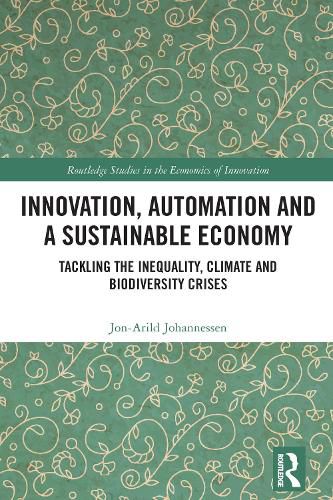Readings Newsletter
Become a Readings Member to make your shopping experience even easier.
Sign in or sign up for free!
You’re not far away from qualifying for FREE standard shipping within Australia
You’ve qualified for FREE standard shipping within Australia
The cart is loading…






Economic inequality, the environmental crisis and the climate crisis are systemically linked. Accordingly, they should be understood as a single, interconnected system and strategies for resolving them should be guided by this understanding. This book demonstrates how the Green New Deal and its systemic alternative, the Red New Deal, could influence the course of these three global crises, all within the context of the Fourth Industrial Revolution.
The author has developed several scenarios that are relevant to the automation that will result from advances in artificial intelligence and intelligent robots. The first is one of mass unemployment, while the second envisages low rates of unemployment, although workers will experience stagnation and then a decline in their wages. It is possible to envisage a different set of scenarios; however, we must replace the capitalist economic model with a different model: mutualism, a sustainable model that would allow for economic growth while also addressing the three current systemic crises. The author argues that if such a model is implemented, there will be jobs for everyone and the climate crisis will be tackled because people's welfare will be prioritized over profit. We can assert that such a model will foster the development of economic equality. The basic premise of this mutual and sustainable economic model is that sustainability is in everyone's interests.
The book employs not only established and innovative methods, such as literature reviews, scenario thinking and historical methods, to underpin its arguments, but also conceptual generalization as an intellectual tool to tackle the general research problem; thus, it will be an invaluable resource for scholars and students of sustainability and the innovation economy.
$9.00 standard shipping within Australia
FREE standard shipping within Australia for orders over $100.00
Express & International shipping calculated at checkout
Economic inequality, the environmental crisis and the climate crisis are systemically linked. Accordingly, they should be understood as a single, interconnected system and strategies for resolving them should be guided by this understanding. This book demonstrates how the Green New Deal and its systemic alternative, the Red New Deal, could influence the course of these three global crises, all within the context of the Fourth Industrial Revolution.
The author has developed several scenarios that are relevant to the automation that will result from advances in artificial intelligence and intelligent robots. The first is one of mass unemployment, while the second envisages low rates of unemployment, although workers will experience stagnation and then a decline in their wages. It is possible to envisage a different set of scenarios; however, we must replace the capitalist economic model with a different model: mutualism, a sustainable model that would allow for economic growth while also addressing the three current systemic crises. The author argues that if such a model is implemented, there will be jobs for everyone and the climate crisis will be tackled because people's welfare will be prioritized over profit. We can assert that such a model will foster the development of economic equality. The basic premise of this mutual and sustainable economic model is that sustainability is in everyone's interests.
The book employs not only established and innovative methods, such as literature reviews, scenario thinking and historical methods, to underpin its arguments, but also conceptual generalization as an intellectual tool to tackle the general research problem; thus, it will be an invaluable resource for scholars and students of sustainability and the innovation economy.